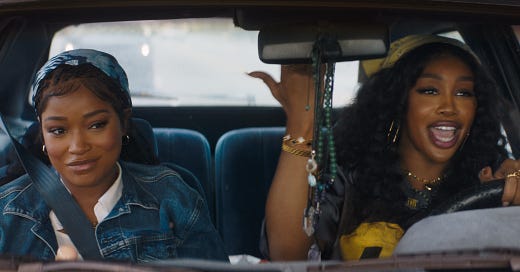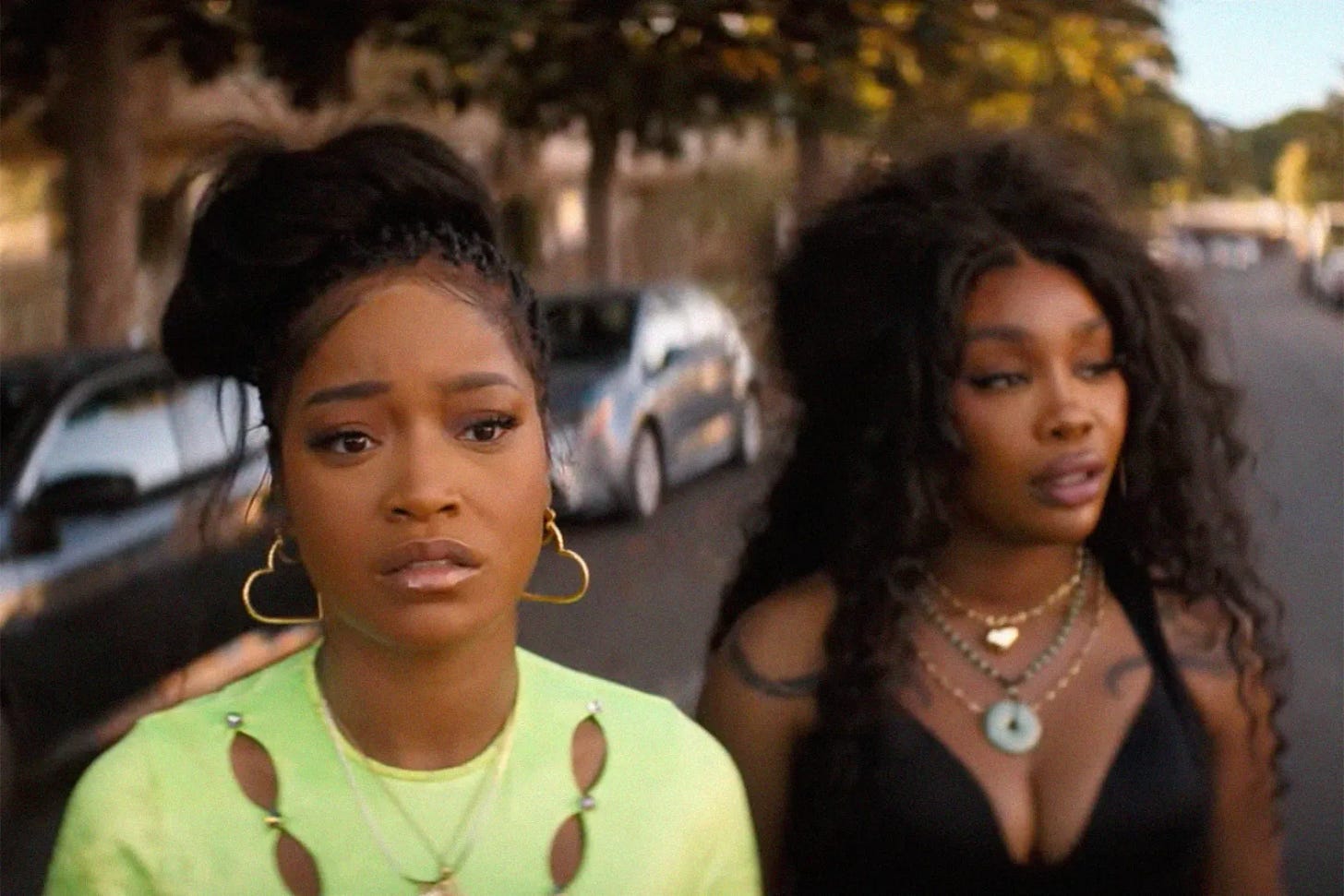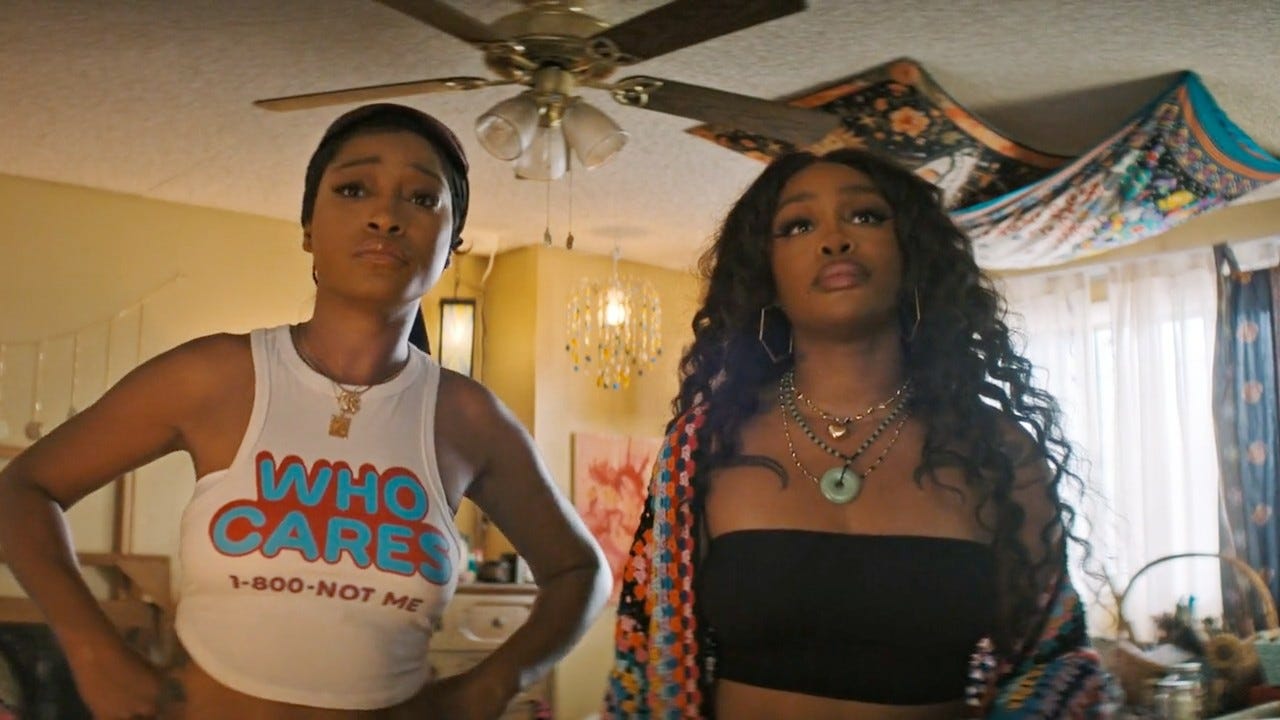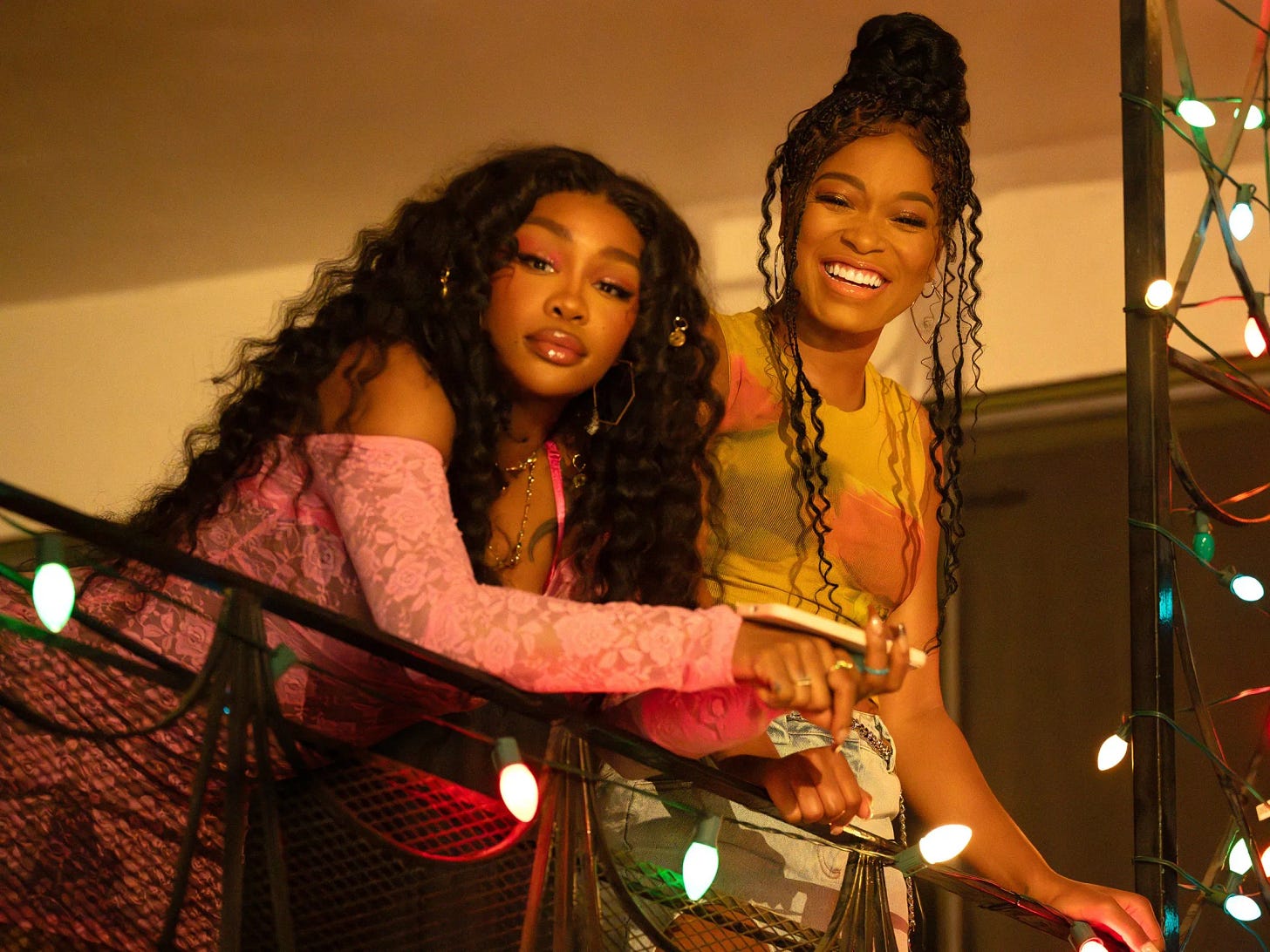What 'One of Them Days' Teaches Us About Chasing Emotionally Unavailable People
The Dangers of Centering Relationships That Drain Us
Welcome to The Media Room—where I dive into the themes behind the movies, shows, and cultural moments that shape the world of art and entertainment.
In the hit movie One of Them Days, two friends, Dreux (Keke Palmer) and Alyssa (SZA), race against time when they discover Alyssa's boyfriend has stolen their rent money. Their frustrated landlord gives them until evening to pay up—or face eviction.
One of Them Days gave us more than cute chaos and a few good laughs. Underneath the humor was a haunting truth: SZA’s character was abandoned by the very man she was centering and ended up at risk of homelessness because of it.
Male-centered women have become a topic of conversation all over social media. If you scroll on Threads, for example, these women are defined as "dangerous," "scary," and even "envious." We see this played out in One of Them Days as the friends are not only robbed by Alyssa’s boyfriend, but he leads his side-chick to her so she can beat Alyssa up, and cause more chaos in her and Dreux’s life.
It was satire, yes–but also painfully familiar. It was a visual metaphor for what happens when women keep pouring into emotionally unavailable, disrespectful, and disinterested men, hoping love will be enough.
So let's talk about it—because the problem isn't just the guy. It's the social conditioning that taught women to attach their identity to their relationship status and prioritize men who wouldn't even inconvenience themselves for a woman in return.
Being male-centered is a colloquial term that describes a woman who panders to and puts men on a pedestal. These women are considered "dangerous" by their friends because they will put themselves and others at risk to prioritize men, even at the cost of their own safety and emotional well-being. This is not the same as a woman who compromises in a healthy relationship with mutual respect, reciprocity, and effort from a partner who equally prioritizes her. Instead, this describes a woman prioritizing a man who has proven to be disrespectful, disinterested, and even disdainful toward her through his negligent, neglectful, and harmful behavior.
You might recognize this pattern—perhaps you know someone like Alyssa who consistently prioritizes emotionally unavailable partners, or maybe you've found yourself walking in Alyssa's shoes, giving your all to someone who offers nothing in return. Whether you're watching from the sidelines or living this reality yourself, it's important to understand that these patterns aren't random—they're deeply rooted in our experiences and social conditioning. So, what drives this self-defeating pattern? Here are six psychological insights that explain why.
1. Sunk Cost Fallacy: "But I already gave so much…"
We convince ourselves we must see it through because we've already invested time, energy, and emotions. This is the sunk cost fallacy: the false belief that sticking with something bad is better than "wasting" what you've already given. But what's actually wasted is our peace, safety, and potential—staying keeps costing us more.
Ask yourself: How much of your mental energy, self-worth, and inner peace are you willing to sacrifice by staying in a relationship that consistently causes you harm?
2. Cognitive Dissonance: When the truth hurts too much
We want to believe this person loves us. So when their behavior contradicts that belief—when they don't show up, don't care, don't choose us—we rationalize it. We say "they're just going through something" or "I know they love me deep down." That tension between what we know and what we want to believe? That's cognitive dissonance. And it keeps us stuck in a story that's not real.
3. CPTSD & Reenacting Abandonment Wounds
For many, love feels unsafe because it was unsafe. If we grew up with inconsistent caregivers, or were emotionally neglected or abandoned, we may unconsciously seek that same pattern in adulthood. We chase emotionally unavailable people because they feel familiar. And we think if we can finally "win" their love, it'll heal what we couldn't fix in the past. This is how CPTSD (Complex PTSD) keeps us in cycles that hurt—but feel like home.
Reflect: How many of your relationship patterns mirror the emotional climate of your childhood?
4. Struggle Love as Social Conditioning
Let's be real—struggle love is marketed to women like it's a badge of honor. Be the ride-or-die. Be the woman who "held him down" until he got it together. We're told that sacrifice makes us worthy. But all that does is make it easier to abandon ourselves while calling it love.
5. Loyalty as a Trauma Response
There's a big difference between loyalty and survival-based attachment. When we learn early that love is earned through fixing, proving, or suffering, we stop asking: Is this person even good for me? We stay not out of connection, but out of fear—fear of being alone, of being rejected, of being unloved. But true love isn't about proving your worth. It's about being safe to exist as you are.
6. Confusing Intensity for Intimacy
Unpredictable, chaotic love can feel intoxicating—but that's not intimacy. That's an activated nervous system. We mistake adrenaline for connection. But real love is regulated. It's boring in the best way. And when you've been conditioned to expect harm, peace can feel unfamiliar—even unsafe.
Reflect: Has peace in a relationship ever made you feel uncomfortable? What patterns or behaviors make you feel most "at home" in relationships, and why do you think that is?
The Takeaway: Respect is The Key to A Healthy Relationship
Sometimes "one of them days" is actually the day you wake up—the day you realize being chosen isn't the same as being cherished. You don't have to keep centering people who wouldn't even circle back for you.
A healthy relationship is built on mutual respect, open communication, and emotional safety. Both partners should feel heard, valued, and supported. There's no room for manipulation, gaslighting, or emotional neglect–instead, there's transparency, consistency, and genuine care for each other's well-being.
You deserve someone who shows up consistently, makes space for your growth, and celebrates your independence. Remember: love shouldn't deplete you or put you in harm's way–it should nurture you.
Watch The Trailer
What themes from this piece resonated with you? Leave a comment and stay tuned for Friday’s email: Reflect & Release!









“ Sometimes "one of them days" is actually the day you wake up—the day you realize being chosen isn't the same as being cherished. You don't have to keep centering people who wouldn't even circle back for you.” the truth and nothing but the truth!
This is my movie. I have saved this to read later. I’d love to stay connected in this creative space qwand would be honored if you’d follow me back too. Let’s grow, write, and heal unapologetically—because this is what community looks like.
https://substack.com/@msmaine/note/c-108582438?r=1t2agi&utm_medium=ios&utm_source=notes-share-action